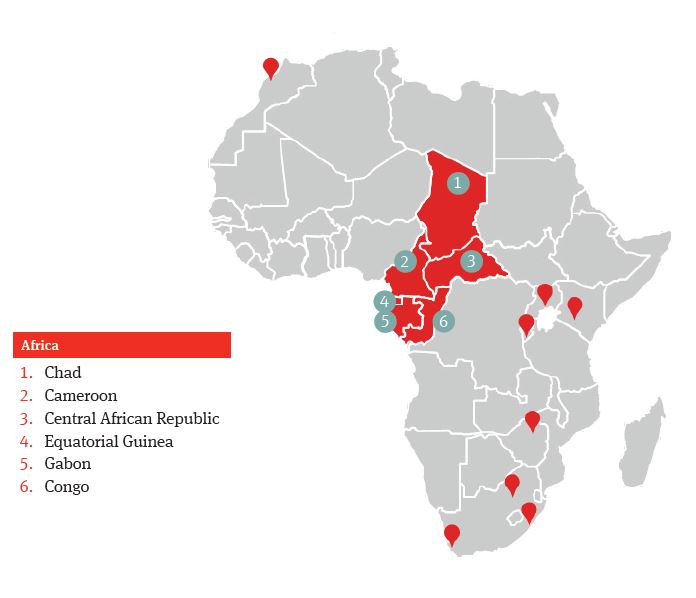Introduction
The new Currency Exchange Regulation nº02/18/CEMAC/UMAC/CM of
the Central African Economic and Monetary Community (CEMAC) (the New
CEMAC Currency Exchange Regulation) finally entered into force on
March 1, 2019 after several years of debate. It cancels and fully replaces
the former regulation nº02/00/CEMAC/UMAC/CM dated April 29, 2000
(the Former CEMAC Currency Exchange Regulation).
Following the sudden drop in oil prices during the second semester of
2014, a new regulation strengthening the currency exchange policy of
CEMAC region was called for among the CEMAC States and was debated
at governmental level since the 2016 Malabo and Youandé presidential
meetings. Built on the lines of the declarations made on June 27, 2018
by the Governor of the Bank of Central African States (BCAS) during the
10th Annual Concertation Meeting with the CEMAC Banking and Financial
Institutions regarding the alarming state of currency reserves in the CEMAC
zone, the New CEMAC Currency Exchange Regulation was finally adopted on
December 21, 2018.
In this context, the development and financing of any energy or infrastructure
projects in CEMAC member States (i.e. Cameroun, Central African Republic,
Republic of Congo, Gabon, Equatorial Guinea and Chad) will need to
take into account the provisions of the New CEMAC Currency Exchange
Regulation and more particularly the following matters.
The transfer, payment and settlement of routine business transactions are now subject to more stringent administrative control
(Article 6 of the New CEMAC Currency Exchange Regulation)
Any transaction for an amount above 1 million CFA Francs (i.e. approximately
1,500 Euros) per month and per entity remains free subject to evidencing the
origin of the funds to be transferred and the delivery of the documents requested
by the certified commercial banks (intermédiaires agréés) in order to prevent and
sanction money laundering and the financing of terrorism.
The opening of a current account in foreign currencies outside the CEMAC member States is now subject to an authorisation of the BCAS
(Article 41 of the New CEMAC Currency Exchange Regulation)
We note that the Former CEMAC Currency Exchange Regulation did not provide for any
provision in this respect.
Project financing is generally conducted on a non-recourse basis, meaning that the project
revenues generated locally in CFA Francs are the only source of repayment for the lenders.
Lenders are therefore very keen to secure such revenues and isolate them from a variety of
risks, including onshore bank credit risk, enforcement risk (in the case of project company
default), exchange rate risk, convertibility risk and transferability risk.
To minimize such risks, lenders usually require accounts to be opened offshore (for example
in Paris or in London) and operated in a way permitting monthly conversion of project
revenues into hard currency and transfer to such offshore accounts of the revenues not
required to pay local currency costs.
The new provision requiring BCAS authorization for the opening of such offshore accounts
means that the BCAS’s policies regarding the granting of such authorizations will be decisive
as to the bankability of international energy and infrastructure projects to be developed in
the CEMAC region.
The terms and conditions of the authorisation for the opening of a current account in
foreign currencies outside CEMAC member States are not clearly defined by the New CEMAC
Currency Exchange Regulation and this will need to be clarified as the payment of several
exportations (including Oil and Gas exportations) are usually subject to payments in US
Dollars and the opening of bank accounts outside CEMAC member States is often used in
energy or infrastructure projects.
The opening of a current account in foreign currencies inside CEMAC member States is now also subject to an authorisation of the BCAS
(Article 43 of the New CEMAC Currency Exchange Regulation)
Under the Former CEMAC Currency Exchange Regulation, this prerogative was granted to the
Ministry in charge of finance of each individual CEMAC member States. The new regulation,
requiring such authorisation to be granted centrally by the BCAS, demonstrates the more
stringent control that the BCAS intends to apply within CEMAC member States.
The terms and conditions of such authorisation are not clearly defined by the New CEMAC
Currency Exchange Regulation and this will need to be clarified. We particularly do not know
if entities already benefitting from an authorisation granted by the Ministry in charge of
finance in their own CEMAC member state pursuant to the Former CEMAC Currency Exchange
Regulation will need to request a new authorisation from the BCAS in accordance with the
New CEMAC Currency Exchange Regulation or whether they may continue to rely on the
existing “local” authorisation.
The obligation to repatriate exportation proceeds is maintained and no exception is provided
(Article 53 and seq. of the New CEMAC Currency Exchange Regulation)
The New CEMAC Currency Exchange Regulation provides (in line with the Former
CEMAC Currency Exchange Regulation) that exportation proceeds above 5 million CFAF
(i.e. approximately 7,622 Euros) must be repatriated within 150 days1 as from the exportation
date (you may recall that under the Former CEMAC Currency Exchange Regulation, operators had
30 days to comply with this obligation) into a certified commercial bank (intermédiaire agréé).
This is in practice burdensome and many foreign investors will probably consider as
unfortunate the fact that the promulgation of the New CEMAC Currency Exchange Regulation
did not afford the opportunity of introducing an exception (as the case may be subject to an
authorisation of the BCAS) to this mechanism.
We emphasise that each entity operating within the CEMAC region will have to comply with
the provisions of the New CEMAC Currency Exchange Regulation within six months as from
its entry into force. The exact consequences of the enforcement of the New CEMAC Currency
Exchange Regulation still need to be clarified (as this will depend on the manner in which the
New CEMAC Currency Exchange Regulation will be interpreted and implemented in practice)
but the clock began ticking on March 1, 2019.






